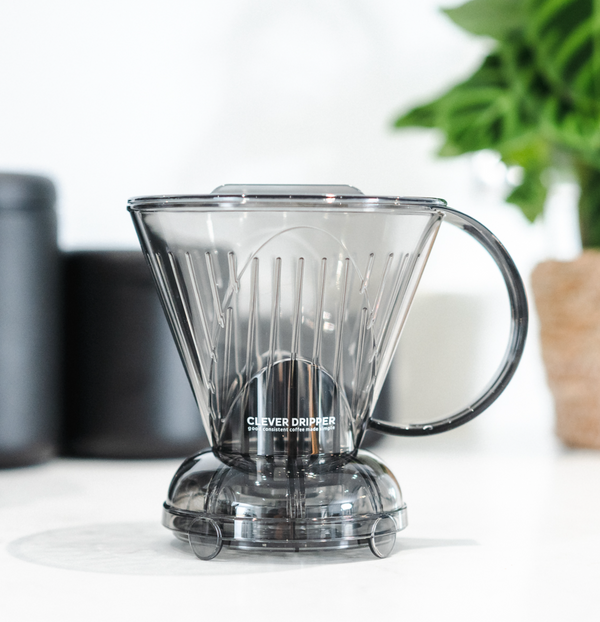
Pre-Ground Coffee Versus Whole Bean - The Differences Are Staggering
The question of whether to purchase whole bean or pre-ground coffee can sometimes strike up a bit of a conundrum for coffee consumers.
Those that have never tried whole bean coffee before might believe that the similarities between whole bean and pre-ground are almost parallel with each other.
However, the differences can actually be immense in magnitude.
There’s a lot more to preparing coffee from whole bean than there is from pre-ground – including the process of grinding the coffee yourself.
Find out the facts and talking points of both types of coffee, as well as our comparisons of their pros and cons, below.
Pre-ground coffee – the overview
The majority of people often buy coffee that’s pre-grounded and packaged – primarily because it’s the most simple to use, and is the most ready-available form of coffee when completing a routine weekly shop.
People also lean towards pre-ground coffee because they are sometimes unsure on how to prepare coffee from scratch through whole bean coffee. On the contrary to this, pre-ground coffee is ready to brew, considered easy to prepare, and doesn’t require any extra skills.
Not only this, but pre-ground can save you valuable time through convenience and quickness of preparation, which makes it ideal when running late for work or morning classes.
If this method suits you best, we recommend purchasing around a week’s worth of grounds at a time to ensure that you get as much flavour out of the pre-grounded beans as possible.
If you prefer pre-ground coffee for ease and convenience, we have kettles that can be scheduled for a pre-set temperature at a time of your choice. View our range here.
The benefits above are what encapsulate the positive aspects of pre-ground coffee. However, pre-ground coffee almost always sacrifices the wonderful flavours that no coffee fan would say no to, due to the lack of freshness.
This is the main attribute that sets the whole bean coffee experience apart from its counterpart.
Whole bean coffee – the overview
If you want to create the most flavourful and pure form of coffee, there’s no doubt that buying your beans whole is the surest method of achieving this goal.
If you buy whole beans, and then grind them up a matter of minutes before you brew up your pot of coffee, you’ll notice the flavour is far stronger and the subtle tastes of your specific type of bean are more noticeable; which contributes to a more delicious hit of coffee.
Whole beans produce that “fresh” quality that everyone strives for in a cup of coffee.
Ground beans, on the other hand, tend to lose the fragrance we want when we open a new bag of beans because the core of the flavours will have already evaporated and poured away from the beans when they were roasted and ground before purchase.
Therefore, the sooner you use coffee after grinding it, the more of the original intended flavours there will be; even vacuum-packed cans of coffee will be far less fresh than grinding whole beans yourself.
Find out more about the impact that processes have on the taste of coffee throughout the world.
Having stated the significance of grinding, let’s delve further into the differences between pre-ground and whole bean coffee by discussing this vital process in more detail.
Grinding coffee beans yourself
Grinding is a crucial and critical component of the brewing process.
Depending on what brand of pre-ground coffee you buy, you wouldn’t normally get to select how fine or coarse your coffee is. This is where whole bean coffee comes into play.
If you grind it yourself, you can create a batch of coarse coffee for your French press or some fine grinds for your espresso machine.
As you'll generally be grinding small amounts moments before you begin brewing, you can alter the level of fineness at your whim.
Ideally, an even grind is the optimum kind of grind. If you don’t have a certain quality of grinder, you won’t be able to extract the maximum flavour out of the beans. Some grinders can’t provide an even grind, which means when hot water passes over the grounded coffee for brewing, it’s passing over an uneven surface area.
Is it great or does it grind your gears?
Depending on how much you enjoy the artisan aspect of coffee preparation, coffee grinding can either be seen as a pro or con to using whole beans.
This is because the coffee grinder will need cleaning after use, the process itself requires that you use extra effort and subsequent time, and of course you’ll need to be able to budget for your ideal coffee grinder.
However, once you have practiced grinding a number of times, it will only take around a couple of minutes to grind up enough beans for a pot of coffee.
Additionally, the right model of coffee grinder will provide more controls, features, and are likely to last you a long time with great results in the form of amazing-tasting coffee.
We provide a plethora of kettles to choose from. Proudly, all of our products are personally selected through preference and quality from what we’ve sampled from the market.
Coffee as a lifestyle, not just a drink
In conclusion, it’s up to you to decide which type of coffee, pre-ground or whole bean, suits your way of life and circumstances the most.
Whole beans will give you a fresher cup, control over your own level of coarseness, the gratification that comes with complete coffee creation, and the purest, most satisfying taste of coffee available.
On the other hand, pre-ground coffee is far quicker and easier to prepare.
This means if sometimes wake up later than expected in the morning, or you don’t currently have the time to learn the arts of coffee grinding, you might be willing to sacrifice the taste and control of whole beans – for the time-being at least.
Whatever your choice of coffee grounds, we have an outstanding collection of coffee equipment, espresso machinery and general accessories to help you deliver the finest results in coffee taste.











